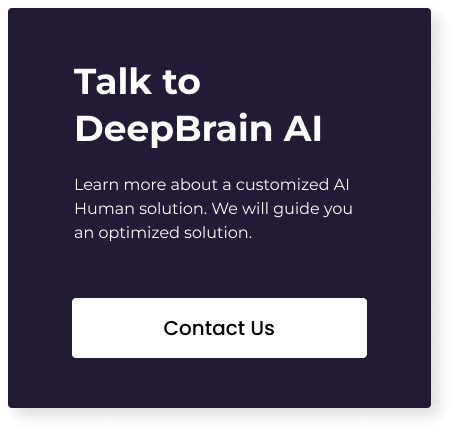DeepBrain AI, a company specializing in artificial intelligence (AI) and reviving dead parents as AI avatars, aims to become an AI unicorn as it expands into the US and China markets after raising funds in August.
“In the long term, I think it is quite possible for DeepBrain AI to become a unicorn, recognized as an AI technology unicorn in the world among Korean startups,” DeepBrain AI CEO Eric Jang told TechNode Global. “We are profitable and this year’s revenue is expected to reach about $7 million.”
The firm, which has moved its headquarter to US, posted a revenue of $2.5 million last year, according to him.
In order to increase revenue outside of South Korea, Deepbrain AI has set up a corporation to target the US and Chinese markets.
 In January, it established an American corporation and secured many partners for AI human development across the country and is proceeding with global commercialization.
In January, it established an American corporation and secured many partners for AI human development across the country and is proceeding with global commercialization.
DeepBrain AI has raised $44 million in Series B funding, led by Korea Development Bank and VC firm IMM in August, at a post-money valuation of $180 million. The series B investors join existing investors including IDG Capital China, China’s biggest venture capital firm CH & Partners, Donghun Investment II, L&S Venture Capital, and Posco Tech Investment, bringing Deepbrain AI’s total funding to roughly $52 million, according to Jang.
Founded in 2016 in Seoul, South Korea but moved its headquarters to the US this year, Deepbrain AI provides a range of AI-powered customer service products. Its featured solutions are AI STUDIOS, AI HUMAN, AI KIOSK.
AI STUDIOS is revolutionary script-to-video production, AI HUMAN is virtual employees that interact with natural language processing. Brand Ambassadors, Bankers, Retail Assistants, Tutors, News Anchors, and more. AI KIOSK, on the other hand, is a complete hardware and sofware package for virtual employees on the edge or in the cloud. Also available as an upgrade to existing kiosks or chatbots.
One of its products, Re;memory, is a virtual human service based on AI technology which recreates the clients’ late family members by recreating their persona – from their physique to their voice. The service is for those that wish to immortalize their loved one’s story of life through a virtual human.
The service is not only available in South Korea but it is available all over the world. However, customers will have to visit South Korea to create an AI avatar.
“To make a digital twin (avatar), we have to film him reading about 300 sentences. So, customers should come to Korea. After the AI goes through the videos with data, the digital twin is completed. The cost of producing a digital twin has been greatly reduced. In the past, it was expensive enough to be used only by companies, but now it’s cheaper,” Jang said.
According to him, DeepBrain AI calls the synthetic recreation a Rememory and is pitching the concept as a way for those who loved the person who passed away to have one last reunion.
Rememory uses technologies such as speech and video synthesis, natural language processing, and speech recognition to create virtual humans with the faces, voices, and expressions of the parents of users who have applied for this service. It’s not just the looks that look alike. Since they have an interview with their parents before they were alive, compose a scenario with various episodes and teach them to AI, they can talk with Human AI about past memories even after their parents have passed away, its website showed.
Thanks to the rapid development of text-to-speech (TTS) and deepfake technology through AI deep-learning. The AI analyzes the deceased’s voice samples while he was still alive to understand the high and low tones as well as the deceased’s unique pronunciation habits.
Based on this, it creates a sound similar to the real person. A few years ago, to reproduce the voice like this, hundreds of sentences had to be recorded for three to four hours each, but recently, with the development of AI, it is possible to record voices in less than a minute.
Jang said reactions to the advent of AI technology to reunite with a deceased family member or loved one have been mixed. Proponents of positivity say that it has the effect of comforting and healing those who are suffering from bereavement.
There is also a prospect that ‘digital portraits of the deceased’, which reproduce the voices and images of the deceased, will spread in the future. It means that leaving voice and image data for AI synthesis will become common just like taking a picture of a portrait in advance.
On the other hand, there are still people who feel psychological discomfort about reproducing the voice and appearance of the deceased.
The question is whether it is reasonable to freely reproduce the voice and body image of the deceased without the permission of the deceased, if the family wants it.
Jang opined that Rememory service is a warm technology developed with the purpose of providing comfort to families who miss the deceased by using its internationally recognized AI human technology. “We will create a new funeral culture,” he said.
A similar service is provided by Amazon. Amazon recently introduced a new feature to bring the voices of deceased family members back to life through its voice assistant service ‘Alexa’.
Jang said DeepBrain AI is conducting a business to make and sell the profits of AI Human into non-fungible token (NFT) sculpture products, when asked about its plan for the rest of 2022 and 2023.
In 2023, with the goal of generating $2 million in sales in the US, it also plans to focus on developing AI humans (avatars) for US celebrities.
Source: TechCrunch Technode reported on the topic of rememory.







